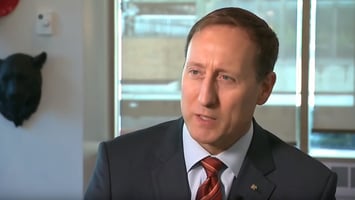Your spokespeople will face awkward and uncomfortable questions in their media interviews.
Many politicians have faced questions about the price of milk and bread.
It is an entirely predictable line of questioning. But it is also one many spokespeople have stumbled over.
Rishi Sunak is latest to add his name to the long list of those it has tripped up. And it capped a miserable couple of days for the chancellor filled with faltering, tetchy media interviews and misfiring PR opportunities.
The bread question came up during an interview with BBC Breakfast as he set out to defend his spring statement.
But before we look at it, it is crucial to see it in the context of a chancellor who is desperate to show his millionaire status does not mean he is out of touch with the plight of people facing spiralling costs.
Reporter Nina Warhurst asked Mr Sunak what food item he had noticed going up the most in supermarkets.
“It’s probably, I think bread, probably is the thing,” he replied. “The one we buy, I’m sure, is now about £1.20, and it was about £1, from memory.”
A reasonable response so far. But then it began to crumble.
Asked what kind of bread, the chancellor said: “It’s a Hovis kind of seeded thing.
“We have a whole range of different – we all have different breads in my house, a degree of healthiness between my wife, myself and my kids,”
The Chancellor tells #BBCBreakfast he has noticed an increase in the price of a loaf of bread in the weekly shop. 🍞🛒
— BBC Breakfast (@BBCBreakfast) March 24, 2022
Rishi Sunak MP has been speaking to @NinaWarhurst this morning. https://t.co/f1wT3d0TMT pic.twitter.com/UrmId40MKG
That unguarded comment, presumably added to bring a snippet of his character and home life into the interview, was misjudged.
Having four different loaves to choose from must feel like a banquet to those struggling to put any bread on the table.
And he made the comment a day after Richard Walker, the boss of Iceland, warned that food banks were turning down potatoes because people cannot afford to boil them – a comment Mr Sunak should have been aware of if he had done his media interview preparation.
Unsurprisingly, the bread comment was seized upon by the wider media:
He was also branded ‘Rishi Antoinette’ on social media.
The tone-deaf response was reminiscent of former Prime Minister David Cameron revealing, at the height of austerity, he didn’t know the price of a loaf because he had a bread maker.
"I don't buy the value sliced loaf, I've got a bread maker at home which I delight in using and it turns out in all sorts of different ways," he said at the time.
There have, of course, been more recent examples of politicians struggling with questions about the cost of everyday items.
Paul Scully, Mr Sunak’s government colleague, could not recall the price of milk on Sky News in January, saying the interview was “not about what I buy as part of a larger shop.”
Australian Prime Minister Scott Morrison faced a similar question last week and responded frankly: “'I'm not going to pretend to you that I go out each day and I buy a loaf of bread and I buy a litre of milk.”
That may be honest, but the question will keep being asked to show whether or not politicians are removed from the budgetary pressures people face.
Mr Sunak’s desperation not to be seen as out of touch also saw him photographed filling up a ‘modest’ car at a petrol station.
But this half-baked idea disintegrated as quickly as the bread anecdote.
It has since been revealed the car was borrowed from a supermarket worker. And footage showing him struggling to make a contactless payment went viral and has resulted in widespread ridicule.
Rishi Sunak, man in charge of country's money, doesn’t know how to use contactless pic.twitter.com/AMZKcfW30J
— The Independent (@Independent) March 24, 2022
"6 packets of petrol, please" pic.twitter.com/2O8NNkx2O5
— joe heenan (@joeheenan) March 24, 2022
More embarrassment for Rishi Sunak at the petrol station as he tries to pay for a sausage roll with six uncut diamonds and a Fabergé egg.
— Have I Got News For You (@haveigotnews) March 25, 2022
And more damaging headlines.
But this is predominately a media training blog, so let’s get back to those media appearances. It was a pretty miserable round of interviews for the chancellor.
There was clear frustration shown at the line of questioning in an interview with the Today programme, where he told the presenter: “If I might just have an opportunity to try and answer the question, that would be marvellous.”
And there was an awkward encounter with Sky News when the conversation moved on to Mr Sunak’s wife’s links to Russia – as we stress on our media training courses, you always need to be aware of the other topics that can be brought into an interview.
Akshata Murthy (Mr Sunak’s wife) has shares in an IT company called Infosys, which operates in Russia and has an office in Moscow.
Earlier this month Mr Sunak urged companies to “think very carefully about their investments in Russia and how they may aid the Putin regime.”
So, presenter Jayne Secker asked whether he was giving advice to others he was not following at home.
“I am an elected politician. and I am here to talk to you about what I am responsible for,” he said. “My wife is not.”
A short, sharp, defensive answer, which sounded much like ‘no comment’. It is also a response unlikely to prevent it from being asked in future interviews.
So, what does this all mean for you and your spokesperson?
Well, if you forgive the pun, it is all about the bread and butter of media training.
Audience
Understand who you are talking to and avoid saying anything that makes you unrelatable.
If you want to suggest to those struggling that you understand their plight, don’t describe the wide range of bread options you have in your house.
Personal
Personal questions often seem innocuous. ‘What bread do you buy?’ does not sound like a taxing question. But personal questions have a habit of causing media spokespeople problems and distracting from the message they want to get across.
The good news is personal questions are often obvious.
If you work in finance, you might face questions about your pensions, savings and spending habits. If you work for the NHS, you might be asked about the last time you managed to get a GP appointment. If you work in nuclear, you could be asked about how you would feel living next to a plant.
Composure
Difficult questions will be asked in media interviews.
There may also be times when you feel the reporter is talking over you or not letting you speak. But you must avoid showing frustration.
The audience is more likely to remain sympathetic if you stay composed.
Negatives
Your interview will be triggered by a particular subject. But that doesn’t mean it is the only topic that will be discussed. Journalists often look to explore other issues.
Often, this comes up at the end as a ‘while you are here’ question. Spokespeople need to anticipate these questions and consider how to answer them without sounding defensive or saying something that becomes a distraction.
Authenticity
Ok, the chancellor filling a supermarket worker’s car with petrol was a PR blunder rather than a media interview one.
But it is a reminder of the importance of authenticity. Spokespeople should be honest, sincere and confident if their messages are going to be believed.
No one believes that the chancellor drives a Kia. Some doubt he even has to visit a petrol station.
Consequently, the photo detracts from what he said, particularly its believability.
Next time you’re in the media spotlight, use your loaf and follow these tips.
Media First are media and communications training specialists with over 35 years of experience. We have a team of trainers, each with decades of experience working as journalists, presenters, communications coaches and media trainers.
Subscribe here to be among the first to receive our blog.




